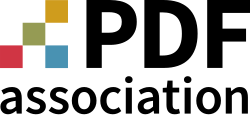 | |
| Abbreviation | PDFa |
|---|---|
| Predecessor | PDF/A Competence Center |
| Formation | 2006 |
| Type | Registered association [1] |
| Purpose | Portable Document Format Standardization |
| Headquarters | Berlin, Germany |
Region served | International |
| Membership | >150 members in ~30 countries |
Executive Director | Duff Johnson |
Main organ | Board of Directors |
| Website | www |
The PDF Association promotes the adoption and use of International Standards related to PDF technology by assisting enterprise content management (ECM), document management system (DMS) and advanced PDF users with the implementation of PDF technology on an organizational level. In order to assist companies in making the most of PDF technology, the PDF Association provides organizations with information and resources on the variety of International Standards available for PDF. [2]